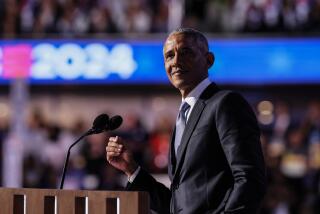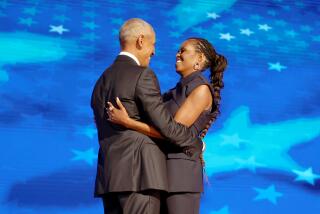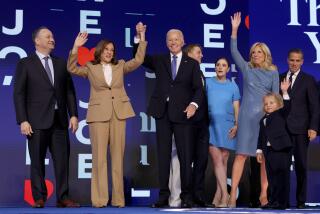Time for Sacrifice, Clinton Says : He Takes Oath, Calls for ‘American Renewal’ : Presidency: Largest inaugural crowd ever hears challenge to invest more in people and jobs and cut the debt. President pledges to ‘end the era of deadlock and drift.’
WASHINGTON — William Jefferson Clinton, the 46-year-old former governor of Arkansas who struggled through a bruising campaign to become the 42nd President of the United States, on Wednesday issued a dramatic inaugural call for sacrifice and change, proclaiming “a new season of American renewal.”
“We must do what no generation has had to do before. We must invest more in our own people, in their jobs, in their future and at the same time cut our massive debt,” Clinton said, after taking the presidential oath at the west front of the Capitol in ceremonies whose simplicity belied the awesome transfer of power and responsibility that they entailed.
“It will not be easy; it will require sacrifice” to revitalize the nation’s economy and meet its daunting social problems, Clinton said. “. . . But it can be done, and done fairly, not choosing sacrifice for its own sake but for our own sake.”
And, in a line that echoed Franklin D. Roosevelt’s call to courage during the Great Depression and Ronald Reagan’s repeated appeals to national pride, Clinton declared: “There is nothing wrong with America that cannot be cured by what is right with America.”
A crowd police estimated at more than 250,000 that extended from the Capitol grounds far down the Mall--the largest inaugural crowd ever--applauded and cheered as the accession of Clinton and Vice President Al Gore ended 12 years of Republican rule of the White House and marked a generational passing of the torch from 68-year-old George Bush to the first President born after World War II.
In a stirring speech that mentioned change nine times and reaffirmed other campaign themes, Clinton pledged to “end the era of deadlock and drift” in Washington. Sitting solemnly nearby, their faces seldom changing expression, were former President George Bush and his wife, Barbara, who left Washington for a new home in Houston less than an hour after Clinton officially took office.
Although Clinton campaigned largely on the economy and other domestic issues, he declared that, to renew America, “we must meet challenges abroad as well as at home. There is no longer division between what is foreign and what is domestic--the world economy, the world environment, the world AIDS crisis, the world arms race--they affect us all.”
The speech came relatively early in an extraordinarily long day, even for Clinton, who is known as a workaholic and night owl. The events began with an emotional church service shortly after 8 a.m. at the Metropolitan African Methodist Episcopal Church, which marked the first time a President ever had attended inaugural services in a black church.
Afterward, he and his wife, Hillary, went to the White House for a 32-minute meeting with President and Mrs. Bush and the two families rode to the Capitol together for the swearing in. Immediately after the ceremonies, the Clintons lunched with congressional leaders at the Capitol and then led the inaugural parade, emerging from their limousine to wild cheers to walk the final blocks to the White House reviewing stand.
They ended their day with scheduled visits to all 11 inaugural balls on a timetable that was to return them to the White House at 2:32 a.m. EST, just 6 1/2 hours before they were to host the concluding inaugural event--a White House open house. To a deafening ovation at the Arkansas gala about 9:30 p.m., the nation’s first saxophone-playing chief executive picked up his favorite instrument and belted out the lead in a rendition of “Your Momma Don’t Dance,” a 1973 rock ‘n’ roll hit by Kenny Loggins and Jim Messina.
In his first official act minutes after being sworn in, Clinton, eager to demonstrate his intention to move vigorously, issued an executive order detailing ethics requirements for executive branch officials. He signed the order with a black-and-gold pen inscribed “Bill Clinton, The White House.”
Then, seated at a table covered with green leather in the President’s Room just off the Senate chamber on the Capitol’s second floor, he signed the nominations of 19 Cabinet-level appointees and six sub-Cabinet choices.
Later, in a proclamation declaring Friday a “National Day of Fellowship and Hope,” Clinton, a Baptist, said:
“As I assume the office of President, I stand humbly before God and ask for His guidance and blessings for our great nation. The obligation of a President is more than the fulfillment of a set of constitutional duties. The President must carry the mantle of hope and optimism in the battle against fear and despair.”
Clinton’s call for sacrifice--a word that seldom if ever crossed his lips during the campaign--may portend strong medicine for the nation’s ailing economy, including proposals to raise taxes, curb entitlement programs and control health care costs.
It was near-perfect winter weather--sunny, with clear blue skies and temperatures in the upper 30s--when Clinton placed his hand on a Bible opened to Galatians 6:8 and took the oath from Chief Justice William H. Rehnquist. Justice Byron R. White, 75, the only Democrat on the nine-member Supreme Court, swore in Gore.
The Bible passage said: “For he that soweth to his flesh shall of the flesh reap corruption; but he that soweth to the Spirit shall of the Spirit reap life everlasting.”
The presence on the inaugural stand of the Supreme Court justices and such older political figures as Bush and former Sens. Albert Gore Sr. (D-Tenn.) and Alan Cranston (D-Calif.), along with the robust young President and vice president, strikingly portrayed the new generation of baby boomers assuming power.
Clinton, ebullient and almost irrepressible since the five-day inaugural program began Sunday, clearly enjoyed himself. He smiled frequently and repeatedly gave thumbs-up signs to well-wishers. He hugged and kissed his wife and his 12-year-old daughter, Chelsea, hugged mezzo-soprano Marilyn Horne and poet Maya Angelou, who took part in the ceremonies, and even bearhugged Vice President Gore.
Angelou, the first poet to read at an inauguration since Robert Frost at John F. Kennedy’s swearing in on Jan. 20, 1961, read a poem she wrote for the occasion at Clinton’s request. The audience cheered as she read in a deep, deliberate voice, hailing Clinton’s arrival as the dawn of a new era of unity and referring to America’s diversity of Asians, Irish, Hispanics, Jews, Africans, American Indians, Catholics, Muslims, “the gay, the straight, the preacher, the privileged, the homeless, the teacher.”
Horne, a Clinton friend since meeting him during a concert in Little Rock, Ark., seven years ago, sang “An American Medley” and concluded the inaugural ceremony by singing “The Star-Spangled Banner.”
Clinton’s speech lasted only 14 minutes--relatively short for an inaugural address, especially for an exceptionally voluble politician who talked much longer than many people listened at the last two Democratic nominating conventions. But the new President spoke forcefully and with rhetorical flourishes that drew enthusiastic responses from the crowd.
“Thomas Jefferson believed that to preserve the very foundations of our nation, we would need dramatic change from time to time,” he declared. “Well, my fellow citizens, this is our time. Let us embrace it.”
To renew America, he said, would require boldness, and he urged Americans to “resolve to make our government a place for what Franklin Roosevelt called ‘bold, persistent experimentation,’ a government for our tomorrows, not our yesterdays.”
Clinton declared that the nation’s founders “knew that America, to endure, would have to change.”
“Not change for change’s sake,” he said, “but change to preserve America’s ideals--life, liberty, the pursuit of happiness. Though we march to the music of our time, our mission is timeless. Each generation of Americans must define what it means to be an American.”
Turning to Bush, Clinton, in another reference to the generational change, said: “I salute my predecessor, President Bush, for his half-century of service to America.”
Bush nodded in acknowledgment, then stood with his wife and smiled while Clinton led the crowd in applauding. The dignitaries in the stands clapped long and lustily but the mass of people below fell silent after a few bursts of applause. It was clearly a Clinton crowd.
Later, while Clinton was still speaking, Bush turned to his wife and said: “It’s a good speech.”
Senate Majority Leader George J. Mitchell (D-Me.), in addition to hailing Clinton’s speech, paid a rare Democratic tribute to Bush in a prepared statement.
“President Bush leaves office with an enormous legacy of accomplishments,” Mitchell said. “Particularly, the two START treaties with respect to nuclear arms will, in my judgment, be regarded by future historians as among the most significant actions of the close of the 20th Century.”
Clinton, a self-styled “new Democrat” who has helped push his party to the center, took a swipe at the Washington power structure, saying that “this beautiful capital, like every capital since the dawn of civilization, is often a place of intrigue and calculation. Powerful people maneuver for position and worry endlessly about who is in and who is out, who is up and who is down, forgetting those people whose toil and sweat sends us here and pays our way. Americans deserve better . . . .”
While out-of-towners applauded, many members of the Washington Establishment remained silent or muttered complaints about the statement.
White House aides said Clinton’s first official act detailing the most stringent ethics rules ever imposed by a President was intended to highlight his commitment to minimizing the influence of lobbyists and the revolving door through which federal officials leave government service only to go to work for industries that they had regulated.
The ethics rules, which Clinton announced early in the transition, prohibit senior appointees from lobbying the government in their areas of work for five years after leaving office and impose a lifetime ban on lobbying for foreign interests.
Among other executive orders Clinton will issue soon, aides said, is one that repeals the so-called gag rule barring personnel at federally funded clinics from discussing abortion with patients.
The traditional lunch that Congress gives for the President after he is sworn in was heavily laced with rhetoric about breaking the gridlock that marred the relationship between Capitol Hill and the White House during the Bush years and much of the Ronald Reagan Administration.
House Speaker Thomas S. Foley (D-Wash.) gave each member of the Clinton and Gore families a plaque bearing one of the letter openers used by aides earlier this month to open the certificates from states formally reporting the victory of the Clinton-Gore ticket in the electoral college.
“May they symbolize the ease with which you will cut through the heavy tangle of legislative challenges to the heart of successful political wisdom and successful governance,” Foley said.
Clinton offered a toast to a “new partnership in America” and said he would not succeed as President unless Congress did well and won public approval.
“Once in a generation, we really are called upon to redefine the public interest and the common ground,” Clinton told the members of Congress. “I honestly do believe much of what we have to do today is work that knows no necessary partisan label and does not fall easily within the conventional divisions of liberal and conservative or Republican and Democrat.”
The transition at the Oval Office began earlier Wednesday when Bush, graciously greeting the Clintons and the Gores at the White House, said, “Good luck to you,” and reached out to shake hands.
Less than an hour later, just as a moving van bearing Arkansas license plates and containing the Clintons’ furniture pulled up, Bush and Clinton entered a limousine bearing the presidential seal for the ride to the Capitol.
The Senate convened shortly after the inauguration and by voice vote without dissent swiftly confirmed three of Clinton’s top Cabinet appointments: former Sen. Lloyd Bentsen (D-Tex.) as secretary of the Treasury, former Rep. Les Aspin (D-Wis.) as secretary of defense and Los Angeles attorney Warren Christopher as secretary of state.
The Senate also agreed to place the nominations of seven other Cabinet members and four other high officials on a fast track for confirmation today.
Today, the five-day inaugural program will end with President Clinton and the First Lady playing host to throngs of Americans at the White House.
Times staff writers William J. Eaton, Edwin Chen, Robert Jackson, Matt Marshall and Constance Sommer contributed to this story.
SPEECH, POEM TEXTS: Clinton’s address, inaugural poem by Maya Angelou. A8
The Trumpet Call, Then and Now
‘Now the trumpet summons us again--not as a call to bear arms, though arms we need; not as a call to battle, though embattled we are--but a call to bear the burden of a long twilight struggle . . . a struggle against the common enemies of man: tyranny, poverty, disease and war itself.’
--John F. Kennedy, 1961 inaugural address
*
‘From this joyful mountaintop of celebration, we hear a call to service in the valley. We have heard the trumpets. We have changed the guard. And now--each in our own way, and with God’s help--we must answer the call.’
--Bill Clinton, 1993 inaugural address
Festivities End Today (Southland Edition, A9)
Here are the last inauguration week events. Times are Pacific Standard:
TODAY
6-9 a.m.: Open house, White House (ticket required)
11 a.m.-2 p.m.: Reception for Arkansans, White House
More to Read
Get the L.A. Times Politics newsletter
Deeply reported insights into legislation, politics and policy from Sacramento, Washington and beyond. In your inbox three times per week.
You may occasionally receive promotional content from the Los Angeles Times.










